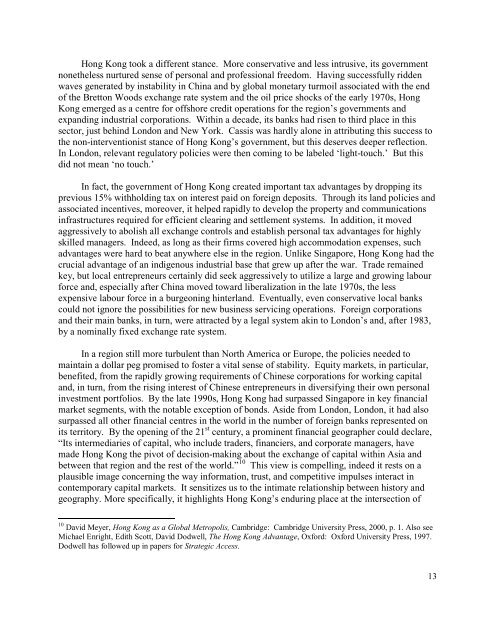Hong Kong's International Financial Centre: Retrospect and Prospect
Hong Kong's International Financial Centre: Retrospect and Prospect
Hong Kong's International Financial Centre: Retrospect and Prospect
Create successful ePaper yourself
Turn your PDF publications into a flip-book with our unique Google optimized e-Paper software.
<strong>Hong</strong> Kong took a different stance. More conservative <strong>and</strong> less intrusive, its government<br />
nonetheless nurtured sense of personal <strong>and</strong> professional freedom. Having successfully ridden<br />
waves generated by instability in China <strong>and</strong> by global monetary turmoil associated with the end<br />
of the Bretton Woods exchange rate system <strong>and</strong> the oil price shocks of the early 1970s, <strong>Hong</strong><br />
Kong emerged as a centre for offshore credit operations for the region’s governments <strong>and</strong><br />
exp<strong>and</strong>ing industrial corporations. Within a decade, its banks had risen to third place in this<br />
sector, just behind London <strong>and</strong> New York. Cassis was hardly alone in attributing this success to<br />
the non-interventionist stance of <strong>Hong</strong> Kong’s government, but this deserves deeper reflection.<br />
In London, relevant regulatory policies were then coming to be labeled ‘light-touch.’ But this<br />
did not mean ‘no touch.’<br />
In fact, the government of <strong>Hong</strong> Kong created important tax advantages by dropping its<br />
previous 15% withholding tax on interest paid on foreign deposits. Through its l<strong>and</strong> policies <strong>and</strong><br />
associated incentives, moreover, it helped rapidly to develop the property <strong>and</strong> communications<br />
infrastructures required for efficient clearing <strong>and</strong> settlement systems. In addition, it moved<br />
aggressively to abolish all exchange controls <strong>and</strong> establish personal tax advantages for highly<br />
skilled managers. Indeed, as long as their firms covered high accommodation expenses, such<br />
advantages were hard to beat anywhere else in the region. Unlike Singapore, <strong>Hong</strong> Kong had the<br />
crucial advantage of an indigenous industrial base that grew up after the war. Trade remained<br />
key, but local entrepreneurs certainly did seek aggressively to utilize a large <strong>and</strong> growing labour<br />
force <strong>and</strong>, especially after China moved toward liberalization in the late 1970s, the less<br />
expensive labour force in a burgeoning hinterl<strong>and</strong>. Eventually, even conservative local banks<br />
could not ignore the possibilities for new business servicing operations. Foreign corporations<br />
<strong>and</strong> their main banks, in turn, were attracted by a legal system akin to London’s <strong>and</strong>, after 1983,<br />
by a nominally fixed exchange rate system.<br />
In a region still more turbulent than North America or Europe, the policies needed to<br />
maintain a dollar peg promised to foster a vital sense of stability. Equity markets, in particular,<br />
benefited, from the rapidly growing requirements of Chinese corporations for working capital<br />
<strong>and</strong>, in turn, from the rising interest of Chinese entrepreneurs in diversifying their own personal<br />
investment portfolios. By the late 1990s, <strong>Hong</strong> Kong had surpassed Singapore in key financial<br />
market segments, with the notable exception of bonds. Aside from London, London, it had also<br />
surpassed all other financial centres in the world in the number of foreign banks represented on<br />
its territory. By the opening of the 21 st century, a prominent financial geographer could declare,<br />
“Its intermediaries of capital, who include traders, financiers, <strong>and</strong> corporate managers, have<br />
made <strong>Hong</strong> Kong the pivot of decision-making about the exchange of capital within Asia <strong>and</strong><br />
between that region <strong>and</strong> the rest of the world.” 10<br />
This view is compelling, indeed it rests on a<br />
plausible image concerning the way information, trust, <strong>and</strong> competitive impulses interact in<br />
contemporary capital markets. It sensitizes us to the intimate relationship between history <strong>and</strong><br />
geography. More specifically, it highlights <strong>Hong</strong> Kong’s enduring place at the intersection of<br />
10<br />
David Meyer, <strong>Hong</strong> Kong as a Global Metropolis, Cambridge: Cambridge University Press, 2000, p. 1. Also see<br />
Michael Enright, Edith Scott, David Dodwell, The <strong>Hong</strong> Kong Advantage, Oxford: Oxford University Press, 1997.<br />
Dodwell has followed up in papers for Strategic Access.<br />
13


